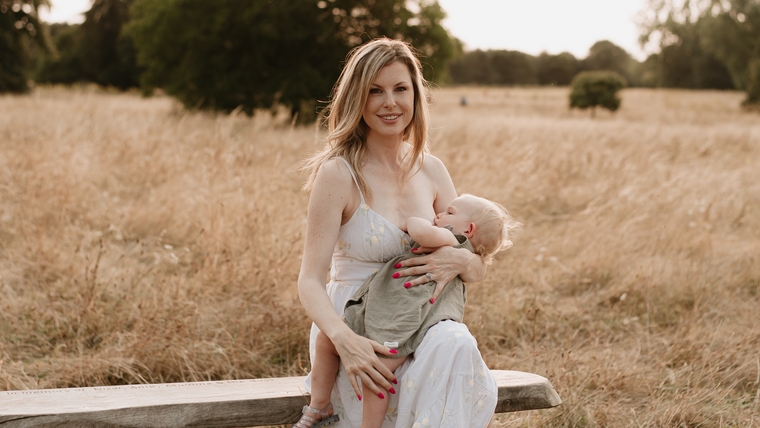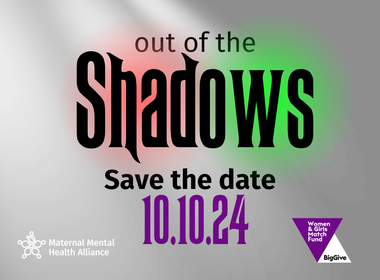Posted By: Amy Tubb
13th October 2024
4 minute read

Like most mums, I had heard about PND and knew it could happen after the baby comes, but I didn't know that depression doesn't happen just postnatally, it can happen throughout the whole perinatal period and wished I recognised it and took action at the time. Looking back now I can see the symptoms clear as day.
I suffered from debilitating hyperemesis gravidarum (HG) throughout both my pregnancies, though it didn't fit the dictionary definition at the time as I wasn't consistently vomiting - but it was consistent agonising nausea and fatigue. I found myself wanting to vomit to at least have some form of relief. I therefore just thought I was at best one of the unlucky ones and perceived by many as one of the weak, dramatic ones who pregnancy just didn't 'agree' with.
I felt I was surrounded by glowing, radiant, and excited pregnant women and here I was feeling like a prisoner inside my own body with how ill I felt, which in turn made me feel like a prisoner inside my own mind as well. The raging hormones inside my body took absolute hold of me, attacking every little piece of light I had inside of me...the ultimate sacrifice for bringing something so joyful into this world. God forbid I ever opened up to share how I was feeling - I should be grateful, jubilant, calm, "motherly". However, all I felt was a hopeless swirling sea of darkness, perpetuated by the fear of the upcoming birth and the impending doom of assumed postnatal depression. There was no light inside me, nor at the end of the tunnel.
I felt like a prisoner inside my own body with how ill I felt.
I begged and pleaded with the doctors to give me the strongest medication they could to cope with the sickness, but the risk to the baby was "too high". The implication of hyperbolic selfishness was overwhelming. Nothing could ease the pain, the medication they could prescribe gave no relief.
Unexpectedly, my first birth experience was better than I could have imagined. After my son latched for the first time the fog cleared and the bond was instant, it was pure euphoria. I even fell back in love with my husband again like it was the very first time we had met. I would relive that time over and over again if I could. The mental anguish was laid to rest replaced by sleepless nights and painful C Section recovery... but the 4th trimester was a walk in the park compared to my pregnancy.
During my second pregnancy, hit yet again by HG, I educated myself further and armed with knowledge from Pregnancy Sickness Support, I now knew what medications I could advocate for myself. While I still was not allowed the medication I wanted and still felt ill, I at least had something that could take the edge off. Despite a small physical win, I still felt the imprisonment of all my rational thinking and as a result my relationship with my husband and son suffered - a whole new complexity to add on top of pregnancy and motherhood. Once again, the dark cloud absorbed my mind... but this time I was armed with my previous experience. I knew that once I had my baby that state of euphoria would hit again and all would be OK again... Except that didn't happen.
Upon my daughter's birth the cloud didn't lift, the immediate bond didn't happen, and the perinatal depression picked up speed like a rolling snowball and evolved into full blown PND. The disappointment and despair were unlike anything I could ever articulate. I had kept myself going through this pregnancy believing that I would wake up from this bad dream with the same euphoria as the time before... but there was none there.
Upon my daughter's birth the cloud didn't lift, the immediate bond didn't happen, and the perinatal depression picked up speed like a rolling snowball.
Where my husband and I felt like loved up teenagers after my son, we were bickering well beyond our years this time round. How had that happened and why? Both my children came into the world the exact same way through planned C-section. How is it possible that every experience can be so different without rhyme or reason? But this is reality and unpredictability of motherhood and the power of female hormones.
I knew I needed help, and I decided to get it at the 6 week postnatal mark. I have always been hesitant of anti-depressants, having been offered them before and having very intense side effects. However, I knew I needed to see this through, and I credit anti-depressants with saving my relationships, my sanity, and my happiness. However, it has come at the cost of intense brain fog which does make me feel like I'm going mad most days. Sometimes it really does feel like you can't have it all, at least not all of the time.
I am still on anti-depressants, but I am hugely proud to say I am one of the 0.5% of women in the UK who are still breastfeeding their child after a year and I plan to try and wean off the antidepressants once my daughter is in turn, weaned off of me. I even launched my own leakproof nursing bra brand Lesh, throughout all this turmoil and despite the mummy brain and brain fog, I have still managed to achieve something remarkable outside of motherhood.
Both my pregnancies were May babies, meaning the height of my HG coincides with when the weather changes from summer to fall. Each year I experience PTSD triggered by this change in season and my body tricks me into reliving the same pain and fear. Like I am destined to relive this forever. Even as I type this, I can feel the judgment and scoffing others would place upon this statement - "how dare you relate pregnancy to PTSD" they would say. Another reason mothers tend to stay silent.
This year, let's bring perinatal mental health out of the shadows. No one should suffer silently, and every woman's maternal journey is valid and should feel seen.
The MMHA would like to thank Kat for sharing her story and helping us bring perinatal mental health Out of the Shadows.
If Kat's words have inspired you to get involved, you can find out more below or:
Double your donation now
From October 10th to 17th, we’re taking part in our first-ever matched fundraising campaign with the Big Give. Together, let's bring perinatal mental health Out of the Shadows.

A seven-day online match funding campaign working with exceptional charities dedicated to serving the women and girls in our communities, fostering a future where every individual can thrive without limitations.